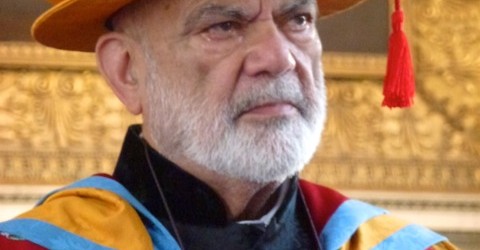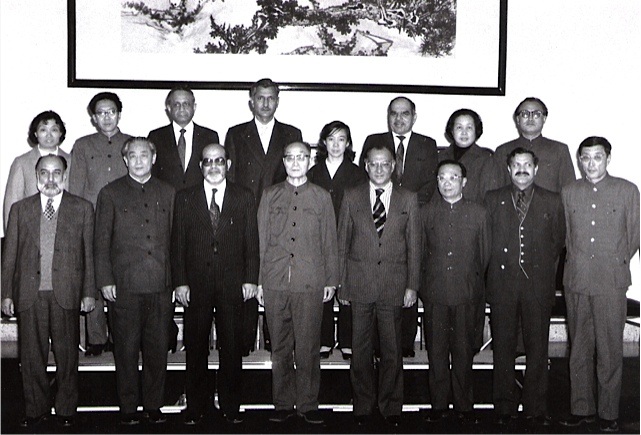
By Dr. Athar Osama
On 12 April 1961, Russia’s Yuri Gagarin became the first man to orbit around the earth in Space. Soon after, United States launched its own quest to conquer space. Kennedy’s vow to send a man to the moon before the end of the 1960s, unleashed an unprecedented race to gain and demonstrate scientific knowledge and technological knowledge between the two super powers.
Soon enough, American Neil Armstrong took the ‘one small step for a man,’ that became ‘a giant leap for mankind’ and rest, as they say, is history. The 1970s became a decade, when man dreamt of venturing farther and farther, into the exciting corners of the galaxy and creating colonies on other planets.
Somewhere within this hugely exciting period of human history, another man was dreaming, what other men in his part of the world, had not dreamt before. While his step was not the first for mankind, it was nonetheless, a brave and audacious attempt, to achieve what was believed not to be possible, within the developing world at the time and certainly, not within the even lesser developed Islamic World.
On November 1972, Pakistan became the first country in the Islamic World – and possibly in the entire Developing World – to fire a rocket into space from its launching pad near the Arabian Ocean. Tariq Mustafa – the person behind this project – thus became Muslim World’s first Rocket Scientist.
Tariq Mustafa’s personal journey to achieve this impressive feat, begins in a rather unassuming way, even though, one can sometimes see the early signs of remarkable things to come. His demeanor also belies the man towering status, as one of the pioneers of space and ballistics technology, in the modern day Islamic World.
Tariq Mustafa at the first post graduate International Reactor School of the United Kingdom Atomic Energy Authority at Harwell, near Oxford- 1957
Tariq Mustafa is the most humble of all people, dressed simply and so welcoming. His childhood life is like all our childhood experiences, where ambitions are high and dreams are fuelled with a can-do attitude. Tariq Musafa remembers growing up thinking, that he must do something to bridge the ‘technology deficit’ faced by his country, in particular, and the Muslim World, in general. And this is where resemblance with the ‘ordinary,’ ends and life, takes a serious and meaningful turn.
A remarkable set of coincidences and an unusual choice of studies, made him the right man at the right time and place. “It was in my third year in chemical technology, when the opportunity came,” recalls Mr. Mustafa. ”An advertisement appeared in the papers, that the Pakistan Ordinance Factories were looking for young people with first class academic credentials, to be sent to the Royal Arsenal in the United Kingdom for training and, the thing that attracted my attention was, that the brighter ones would be allowed to follow a course in Mechanical Engineering at the London University.” His parents did not initially approve of his choice but God has his ways of leading people to their destinations, it seems, and this was made for Tariq Mustafa. Seeing that his mind was made up, his parents relented and the young Mustafa ended up in a five year engineering apprenticeship at the Royal Arsenal. The apprenticeship honed his innate capabilities and ambitions to a large extent, as it not only involved theory but also practice, a combination of which Mr. Mustafa thinks is the best preparation for those who want to enter the field of science.
Having finished his engineering degree, another simple twist of fate enabled him, to transition closer to where he was meant to be. In 1956, the newly formed Pakistan Atomic Energy Commission advertised in the Embassy’s newsletter, to undertake a course in nuclear engineering. These were the heady days of Pakistan’s foray into nuclear technology and talented Pakistanis from across the world, were being sourced into this Programme.
 From a reactors course in the United Kingdom, to a prestigious fellowship at the Oakridge National Laboratory in the United States, Tariq’s multifaceted training and career in mechanical engineering, nuclear science and technology, and propulsion systems provided him with just the right kind of training, to benefit from the challenge and the opportunity that was to come. It came quite soon.
From a reactors course in the United Kingdom, to a prestigious fellowship at the Oakridge National Laboratory in the United States, Tariq’s multifaceted training and career in mechanical engineering, nuclear science and technology, and propulsion systems provided him with just the right kind of training, to benefit from the challenge and the opportunity that was to come. It came quite soon.
One day, while working at Oakridge National Laboratory, he got a call from Dr Salam – by then not yet a Nobel Laureate but still a Presidential Science Advisor, one of the Founders of Pakistan’s Atomic Energy and Space Research Commissions and a scientist of international repute – with the following message:
“Tariq, I can’t explain, but you have to be here in Washington tomorrow morning. You can hitchhike, walk, run, do whatever you want to do but, you have to be here.” Following instructions, Mr. Mustafa immediately departed on what was to become his career defining moment. Upon reaching Washington, Mr. Mustafa accompanied Dr. Salam to NASA to meet with Dr. Fredkin – the Director of International Affairs. A golden opportunity had presented itself. NASA was looking for a rocket launching facility in the Arabian Ocean, from where it could fire rockets to collect some atmospheric data. Pakistan could host this facility and President Ayub was in Washington to do the deal. Fredkin gave young Mustafa 24 hours to visit NASA’s rocket range and prepare a report that would be presented to the President for approval. The next 24 hours would decide be critical, to achieving the stuff of dreams and bring Tariq Mustafa to the forefront of this enormous undertaking. Needless to say, the report was written and approved and hence began this fascinating and eventful journey.
I n the next few months, Dr. Mustafa and his colleagues absorbed themselves in executing the experiment which required data collection to be done through a sodium vapour experiment. The experiment required that the mission of building the facility and launching the rocket, be completed within a very specific window of opportunity. Even though the work was completed in a record time of 9 months, the overall task hit a snag, as clouds hovered over the launch site, as the day of the launch approached. The success of the experiment, depended upon precise measurement of the sodium vapor cloud, released by the rocket, by several observation positions in the vicinity. And they all had to take visual readings at precisely the same point in time.
n the next few months, Dr. Mustafa and his colleagues absorbed themselves in executing the experiment which required data collection to be done through a sodium vapour experiment. The experiment required that the mission of building the facility and launching the rocket, be completed within a very specific window of opportunity. Even though the work was completed in a record time of 9 months, the overall task hit a snag, as clouds hovered over the launch site, as the day of the launch approached. The success of the experiment, depended upon precise measurement of the sodium vapor cloud, released by the rocket, by several observation positions in the vicinity. And they all had to take visual readings at precisely the same point in time.
Despite the weather warnings, the team responsible for the launch decided to go ahead and history was made. Though the experiment wasn’t a complete success, luck favored the brave and the results were good enough to make NASA happy with the outcome. This taught Pakistanis a lot about rocket technology and they decided that it was time Pakistan had its own rocket building capability. Thereon, several smaller experiments were done in an effort to comprehend the mechanics of rocket science and become fluent in developing as well as managing such a technology within Pakistan.
Tariq Mustafa believes this initial learning was critical to developing bigger and better things in the future. “Technology development and absorption does not happen overnight. As you must learn to walk before you can run, so must technological capacity building pass through several stages before a country can develop its own, like Pakistan did with its rocket programme in the 1970s.”
Tariq Mustafa and his team of rocket scientists went on to do many great things. Pakistan Army was facing a dilemma with the relatively short range of their 120 mm cannons and were afraid they would be outgunned by India’s superior technology. Tariq’s team helped use the learning gained through the rocket programme, to create the country’s ground-to-ground rocket programme.
Reminiscing over the past, takes Dr. Mustafa into an ethereal dreamy state and a sudden whiff of reality makes him utterly disappointed at the present state of things. He believes that the reason we have lost out on technological and scientific advances, is because we have decreased our ability ‘to mate with other countries’. He takes a short break, sighs a little and then utters, “I think Islamic countries have made a lot of effort. Egypt is one. Iran another one and then Turkey. But I think, in Pakistan, that connection with the East and the West, was unique and it helped us acquire and indigenize technology.. I think this was the right strategy, that you develop the ability to interact with others. It gives you access to different technologies and the opportunities to learn.”
“We need to build bridges, if we are to develop the capability to reclaim our shared heritage of science and technology,” is the one line piece of advice from the Muslim World’s first rocket scientist. This may not be a bad advice at all, given that most centers of learning and wisdom in the ancient Islamic World – in Baghdad, Cordoba, Istanbul, and Bukhara – flourished where the interactions with other civilizations were the highest.
Following in his illustrious footsteps can once again, position the Muslim World at the front and center of science and technology, in the twenty-first century.
You must be logged in to post a comment.